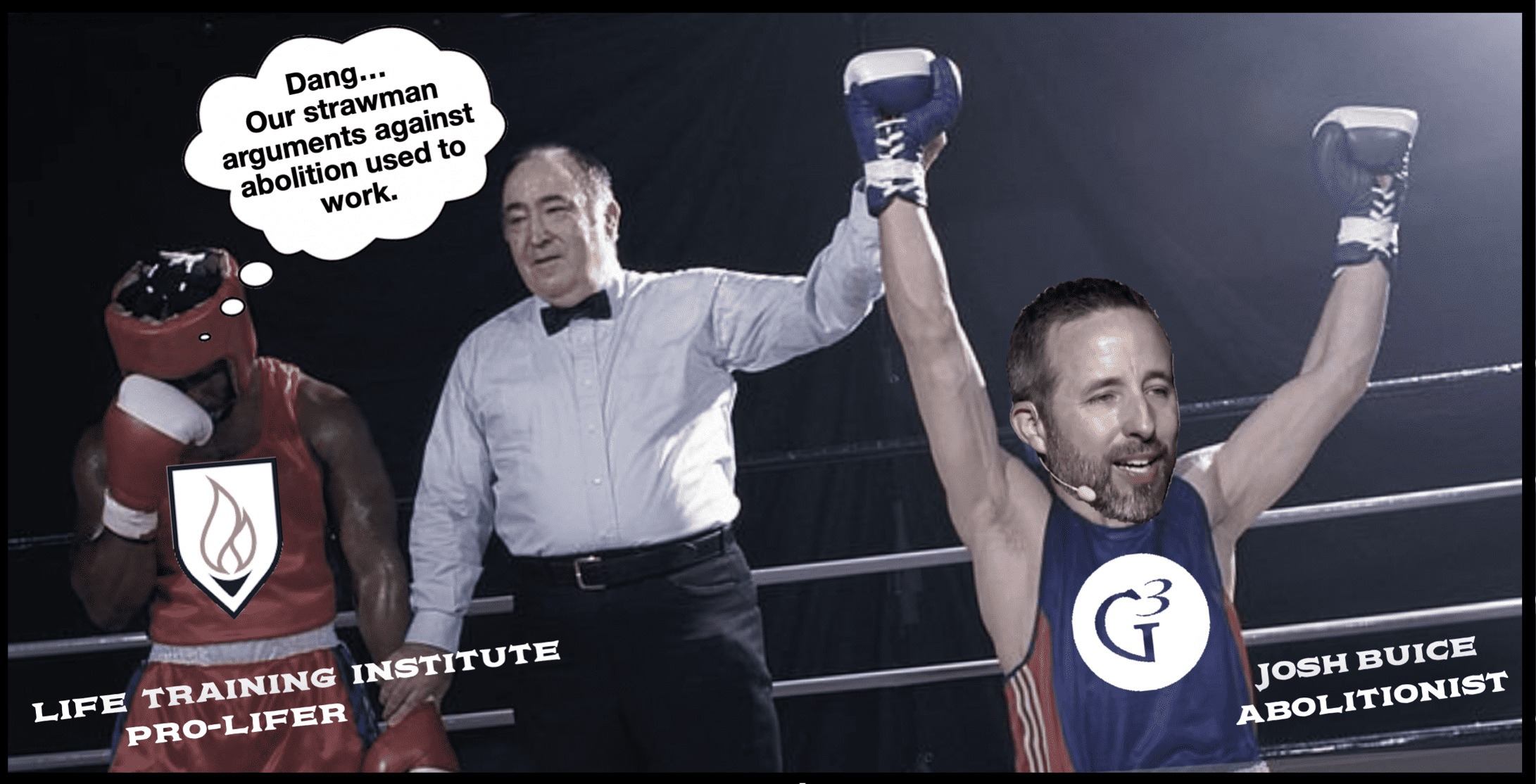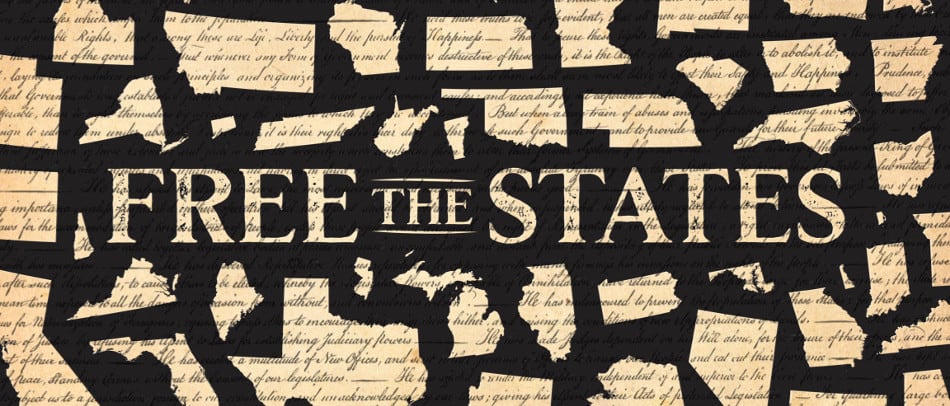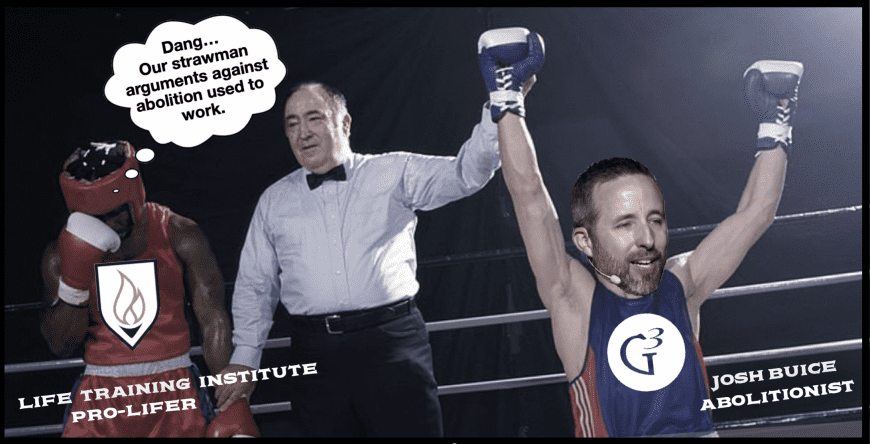
Josh Buice, Pastor of Pray’s Mill Baptist Church and Founder of G3 Ministries, wrote an excellent article last week announcing his support of the Georgia abolition bill and promoting abolitionism; specifically focusing on the abolitionist doctrines of immediatism and equal protection.
Life Training Institute, which, like Buice, is headquartered in Georgia, published a counter-article on Wednesday from Nathan Apodaca arguing both against Buice’s theological arguments and the Georgia Equal Protection Act itself.
On a personal note, in my college days, prior to becoming an abolitionist, I corresponded with Apodaca a good deal as we were both bringing confrontational pro-life activism to our respective universities. We were also both part of PragerU’s college program at the same time. We talked occasionally to share encouragement and advice. He’s a good guy who hates abortion. Sadly, he’s mistaken when it comes to how to fight it politically to the degree that he is calling “a step to [sic] far” what God, in His Word, calls good.
Misunderstanding Equal Protection
Apodaca outright opposes equal protection in his article, but he also demonstrates that he doesn’t understand it.
Buice’s article gives a scenario for the consideration of pro-lifers who oppose criminalizing abortion.
In essence, powerful groups who operate under the banner of pro-life and receive multitudes of millions of dollars from Christians and local churches actually worked to kill a bill in the state of Louisiana that would completely abolish abortion. The rationale was based on an unwillingness to criminalize mothers who murder their babies. So, on the basis of that logic and broken pro-life ethic—is it improper to criminalize a mother who straps her child in a car seat and drives her SUV down a boat ramp into a lake? At what level are we willing to hold mothers accountable for murdering their children?
Apodaca responds:
Criminal law relies on nuance and discretion, something Josh ignores. Even homicide laws have factors that get taken into account during both the investigation and the subsequent prosecution. Josh’s analogy fails to take these factors into account. A woman who purposely drowns her child in a car will be prosecuted for murder. A woman who sinks her car to commit insurance fraud, not realizing until it was too late that her child was inside the car will still be prosecuted, but not for murder. Given the amount of confusion pertaining to the nature of prenatal human beings, it’s ludicrous to hold women accountable for something they didn’t or even couldn’t fully understand.
Apodaca is under the misconception that abolition bills are “aimed at criminal punishments for women,” as he puts it. And because an abolition bill targets women with specific murder charges, Apodaca argues, abolitionists are not taking into account the vast amount of varying scenarios that an abortion might occur within, and which might warrant a lesser charge than murder or no charge at all.
But Apodaca misunderstands the content of an abolition bill. (I wouldn’t be surprised if he has never read one, and has only ever heard pro-life establishment talking points about them.) An abolition bill says nothing of prosecuting women or anyone else. Quite simply, it makes preborn children from the moment of fertilization equal to born people under law. How homicide laws are presently enforced is how prenatal homicide would be enforced upon the passage of an abolition bill.
Of course “homicide laws have factors that get taken into account during both the investigation and the subsequent prosecution.” Buice explained as much earlier in his article: “Every case is unique and deserving of due process under the law.”
Questions and objections regarding how an abolition bill would be enforced are often raised by pro-lifers and pro-choicers. Apodaca and many others argue that abolition bills would result in un-nuanced, unfair first-degree murder charges for all women whose children are aborted. In their woke Holy Post episode on the subject, David French and Skye Jethani argued that enforcing an abolition bill would mean creating a massive spy apparatus to “surveil the world of American pregnancies.” There are numerous other misconceptions in this area, and all of them are answered when the confused individual is told that all an abolition does is establish equal protection for preborn humans. All an abolition bill does is fulfill the golden rule and obey Christ’s prohibition on partiality.
Opposition to Equal Protection
Apodaca also explains his outright opposition to equal protection. He begins his criticism on pragmatic grounds: “Why should the lives of unborn children hinge on whether or not mothers get criminalized for obtaining abortions?” That is, Apodaca believes that the difficulty of passing a bill that criminalizes abortion means we should pass a law that bans abortion without criminalization.
Apodaca’s argument fails by its own pragmatic standard because he assumes the lives of preborn children can be protected without criminalizing the act of abortion. A law “banning abortion” without criminalization is no abortion ban at all. Self-managed abortion has skyrocketed in Oklahoma, Texas, Louisiana, and all the other States that Life News told us were “abortion-free.” These pro-life “abortion bans” simply regulate who is allowed to perform the abortion: namely these bans all explicitly prohibit an abortionist from helping the mother murder her child, while permitting the mother to do so herself. With the ease of finding and ordering abortion pills online, and the anti-abolitionist, pro-life laws that approve of self-managed abortion, it’s impossible to say with confidence that abortion has gone down at all since Roe was overturned.
Apodaca continues his anti-equal protection argument on other fronts. He details the significant opposition that pro-lifers and abolitionists face in media, academia, entertainment, big tech, the Democrat Party and other American institutions, before contending:
Given these cultural trends, belief that the complete abolition of abortion can be achieved only if pro-life groups would simply stop opposing Abolitionist bills that completely ban all abortion procedures all at once is downright delusional and slanderous.
On May 4, 2022, the Louisiana House Criminal Justice Committee passed the Abolition of Abortion in Louisiana Act by a 7-2 margin. Every Republican present voted in favor, some of them enthusiastically so. Rather than the typical “yay” or “nay,” State Rep. Alan Seabaugh gave a hearty “absolutely!” when his name was called.
But when the same bill was heard on the floor of the Louisiana State House on May 12, it was a different story. Seabaugh testified against the bill, joining six other Criminal Justice Committee Republicans in switching their votes to oppose the abolition bill. It was killed by a wide margin. So what was the difference between the committee vote and the floor vote?
The difference was that 76 pro-life organizations wrote an open letter to every State legislator in the country opposing the abolition bill. The pro-life politicians, in many cases, do what the pro-life groups tell them to do. Hollywood, Facebook, Democrats, CNN, and Louisiana State University were all powerless to stop the Abolition of Abortion in Louisiana Act. The bill was sailing through, that is, until the pro-life groups stepped in.
Apodaca finishes the his opposition to equal protection by quoting Francis Beckwith who argues that mothers shouldn’t be prosecuted because America suffers from a “lack of education concerning prenatal development.” Elsewhere, Beckwith has gone as far as saying that “most citizens procuring abortions do so out well-meaning ignorance.”
This is one of those anti-abolition arguments where I can do little else but with Wilberforce proclaim, “I cannot persuade myself that our opponents are serious in using this argument, and therefore I will proceed no farther with this discussion.”
No one who has engaged women going into abortion mills could actually believe that those women are confused about when life begins. No one who has engaged pro-aborts on a college campus (which Apodaca has on many occasions) could seriously assert that those kids don’t know full well what abortion entails.
We have fine education concerning prenatal development. By sixth grade, everyone has been taught precisely when life begins. If it was a public school, the student may simultaneously have been taught by the same teacher that abortion is good, but they were certainly taught when life begins. Pro-abortion thought leaders don’t even bother debating when life begins anymore. The argument is over. They’ve moved on to “Abortion is a form of killing we have to be able to defend,” and “Let’s just give them that it’s killing.” (Scroll through the second page of our Abortion is Murder and Everybody Knows It quadfold for these quotes and more.)
Beckwith and Apodaca know their argument isn’t true. It’s just a line they repeat to justify a more politically palatable position. It’s a poll-tested political talking point masquerading as a principled argument; nonsense masquerading as cunning, nuanced wisdom. America does not have an intellectual problem when it comes to abortion, it has a moral problem. Which, as an aside, is why pro-lifers are wrong to be a theological big-tent and why abolitionists are correct to center the gospel and truth consistent with the Law of God in all argumentation and legislation.
Opposition to Immediatism
Apodaca closes with an argument for incrementalism. Buice, in his article, urged Christians to “not support [heartbeat bills] and to work to abolish abortion completely.” Apodaca responds:
Are we supposed to simply accept the intentional killing of all unborn children unless we are able to put forward legislation to protect all at once, or should we work to save some until we are able to save all?
As explained above, we can protect them all at once in many states if only the pro-life establishment would get on board or get out of the way.
When it comes to what sort of legislation to pursue in blue and purple states, we must ask the question: what has the power to bring revival? What has the power to bring widespread cultural change? What has the power to bring a wicked, abortion-supporter into someone who values preborn children equally? It’s not worldly-wise, truly foolish arguments that babies should be protected because they can feel pain or have a beating heart. It’s the gospel. So we must be consistently Christian all the way through our activism, always forwarding messages and bills that are grounded in and point people back to a coherent, Christian standard of truth. (A whole article could be written on this, but we’ve already done a podcast on the subject, so I’ll point you there.)
Apodaca continued:
He is failing to grasp that pro-lifers who support [a law like the heartbeat bill] are not settling for it. Instead, pro-life advocates are using the law as a way to both protect unborn children as well as bring attention to their humanity, and open the door for people to see the wrongfulness of abortion.
Again, heartbeat bills and pain-capable acts are not bringing attention to prenatal humanity. They are training people to continue thinking within the pro-abortion, humanist, functionalist worldview that says arbitrary characteristics are what make us valuable and worthy of protection.
When I lived in Ohio, I met with the office of my State Senator, Andrew Brenner, a pro-life stalwart. I explained to his aide what an abolition bill looks like and why one needs to be introduced in Ohio. When I was done, his aide said, “This was very interesting, but it’s Senator Brenner’s personal religious conviction that life begins at a heartbeat.” Where did he learn that ridiculous and evil idea that humans don’t have value until their heartbeats can be detected? He learned it from the Heartbeat Bill. Brenner was one of its primary champions. We need to train people to think truthfully and Biblically, not arbitrarily and humanistically.
Apodaca continued:
Minds and hearts tend to change incrementally, so it’s only logical to assume societies will as well.
Apodaca’s argument is predicated on a common misunderstanding of immediatism. Immediatism is not overnight-ism. Immediatists are not under the impression that the culture will drastically change overnight or that the object of their protest will be abolished overnight. We understand, as our 19th century abolitionist predecessors did, that the fight to abolish a great societal evil is a struggle that will likely take years. As William Lloyd Garrison wrote in the August 13, 1831 edition of The Liberator, “Urge immediate abolition as earnestly as we may, it will alas! be gradual abolition in the end. We have never said that slavery would be overthrown by a single blow; that it ought to be we shall always contend.” The immediatism-incrementalism debate does not revolve around how long the battle takes (though the immediatist strategy will certainly achieve the desired end more quickly). The debate revolves around what our demand should be.
The immediatist demands the immediate abolition of the evil. They call the evil what it is, watering nothing down and grounding their demands in God’s word. The incrementalist asks for a compromise with the evil. The tragic consequence of this is that the incrementalist cannot ground their argument in anything substantial.
For instance, the immediatist demand for abortion to be abolished can be grounded in God’s word (You shall not murder) and in the US Constitution (“[No state shall] deny to any person within its jurisdiction the equal protection of the laws.”) An incrementalist’s demand for a 20-week abortion ban or a heartbeat bill cannot be defended from God’s word or the Constitution, as these laws – by implying the legality of abortion prior to the arbitrary standard they set for who counts as fully human – violate both.
Because incremental laws and the incremental arguments made in favor of them cannot be grounded in anything substantial, they are weak and impotent to change culture. In some cases, like that of Senator Brenner, these bills and arguments actually serve to change culture in the wrong direction by dehumanizing the preborn children left unprotected or classified as non-humans by the arbitrary law. Compromise bills and arguments mean compromised foundations, compromised foundations mean no powerful prophetic witness from our demands, and no powerful prophetic witness from our demands means no positive cultural change from our demands. This is one of the many reasons immediatists demand the immediate, and not the gradual, abolition of the evil.
This is what the immediatism-incrementalism debate is about. That societal change usually happens slowly has nothing to do with it.
Three things to do!
- Big tech is cracking down on our ability to reach you! Our social media reach has been greatly decreased in recent months. To make sure you are not missing important content and news about abolition bills from Free the States, sign up for email updates!
- Be an activist! Convert people in your community to abolitionism. The best brief resource in the Abolitionist Movement for turning pro-lifers into abolitionists is the Are You An Abolitionist pamphlet. The best quadfold for outreach to pro-aborts and evangelism is the Abortion is Murder And Everybody Knows it quadfold. You can pick up copies from the Free the States store, along with t-shirts, drop cards, stickers, and activism signs!
- Everything we produce is possible because of the support of our donors. Help fund the fight to abolish abortion! Help us add staff and expand our programs by becoming a monthly supporter of Free the States!



